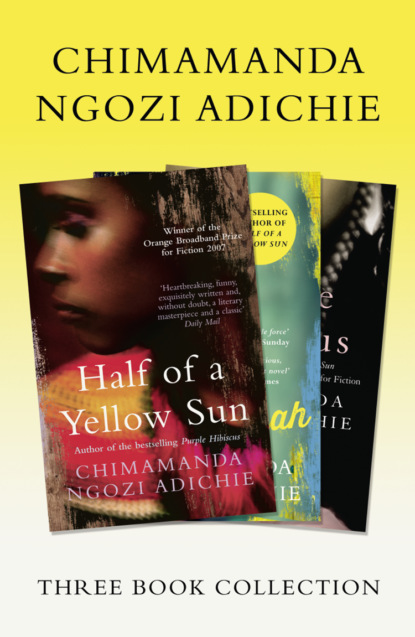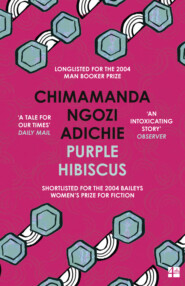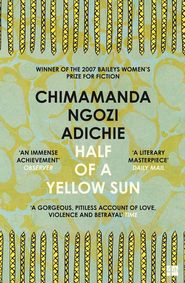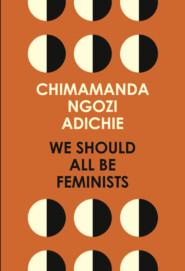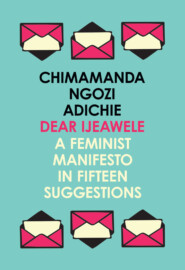По всем вопросам обращайтесь на: info@litportal.ru
(©) 2003-2024.
✖
Half of a Yellow Sun, Americanah, Purple Hibiscus: Chimamanda Ngozi Adichie Three-Book Collection
Автор
Год написания книги
2018
Настройки чтения
Размер шрифта
Высота строк
Поля
‘It’s this wild animal here. We employed him only last month, and he already wants to steal everything in my house.’ She turned back to the kneeling man. ‘This is how you repay people for giving you a job? Stupid man!’
‘What did he do?’ Olanna asked.
‘Come and see.’ Her mother led her out to the backyard where a bicycle leaned against the mango tree. A woven bag had fallen from the backseat, spilling rice onto the ground.
‘He stole my rice and was about to go home. It was only by God’s grace that the bag fell. Who knows what else he has stolen from me in the past? No wonder I have been looking for some of my necklaces.’ Her mother was breathing quickly.
Olanna stared at the rice grains on the ground and wondered how her mother could have worked herself up like this over them and if her mother really believed her own outrage.
‘Aunty, please beg Madam. It is the devil that made me do it.’ The driver’s pleading hands faced Olanna now. ‘Please beg madam.’
Olanna looked away from the man’s lined face and yellowed eyes; he was older than she had first thought, certainly above sixty. ‘Get up,’ she said.
He looked uncertain, glancing at her mother.
‘I said get up!’ Olanna had not intended to raise her voice, but it had come out sharp. The man stood up awkwardly, eyes downcast.
‘Mum, if you’re going to sack him, then sack him and have him go right away,’ Olanna said.
The man gasped, as if he had not expected her to say that. Her mother looked surprised too and glanced at Olanna, at the man, at Maxwell, before she put down the hand placed on her hip. ‘I will give you one more chance, but don’t ever touch anything in this house unless you are permitted. Do you hear me?’
‘Yes, madam. Thank you, madam. God bless you, madam.’
The man was still singing his thanks as Olanna took a banana from the table and left the kitchen.
She told Odenigbo about it on the phone, how it repulsed her to see that elderly man abase himself so, how she was certain her mother would have fired him but only after an hour of revelling in his grovelling and in her own self-righteous outrage. ‘It could not have been more than four cups of rice,’ she said.
‘It was still stealing, nkem.’
‘My father and his politician friends steal money with their contracts, but nobody makes them kneel to beg for forgiveness. And they build houses with their stolen money and rent them out to people like this man and charge inflated rents that make it impossible to buy food.’
‘You can’t right theft with theft.’ Odenigbo sounded strangely sombre; she had expected an outburst from him about the injustice of it all.
‘Does inequality have to mean indignity?’ she asked.
‘It often does.’
‘Are you all right?’
‘My mother is here. I had no idea she was coming.’
No wonder he sounded that way. ‘Will she be gone before Tuesday?’
‘I don’t know. I wish you were here.’
‘I’m glad I’m not. Have you had a conversation about breaking the spell of the educated witch?’
‘I’ll tell her before she says anything that there’s nothing to be discussed.’
‘You might pacify her by telling her that we are trying to have a child. Or will she be horrified at the thought of my having a child? Some of those witchcraft genes may be passed along to her grandchild after all.’
She hoped Odenigbo would laugh, but he didn’t. ‘I can’t wait for Tuesday,’ he said, after a while.
‘I can’t wait either,’ she said. ‘Tell Ugwu to air the rug in the bedroom.’
That night, when her mother came into her room, Olanna smelt the floral Chloe perfume, a lovely scent, but she did not see why a person needed to wear perfume to bed. Her mother had too many bottles of perfume; they lined her dresser like a store shelf: stunted bottles, tapering bottles, rounded bottles. Even wearing them to bed every night, her mother could not use them all in fifty years.
‘Thank you, nne,’ she said. ‘Your father is already trying to make amends.’
‘I see.’ Olanna did not want to know just what it was her father had done to make amends but she felt an odd sense of accomplishment to have talked to her father like Kainene, to have got him to do something, to have been useful.
‘Mrs Nwizu will soon stop telephoning to tell me she saw him there,’ her mother said. ‘She said something catty the other day about people whose daughters have refused to marry. I think she was throwing words at me and wanted to see if I would throw them back at her. Her daughter got married last year and they could not afford to import anything for the wedding. Even the wedding dress was made here in Lagos!’ Her mother sat down. ‘By the way, there is somebody who wants to meet you. You know Igwe Onochie’s family? Their son is an engineer. I think he has seen you somewhere, and he is very interested.’
Olanna sighed and leaned back to listen to her mother.
She got back to Nsukka in the middle of the afternoon, that still hour when the sun was relentless and even the bees perched in quiet exhaustion. Odenigbo’s car was in the garage. Ugwu opened the door before she knocked, his shirt unbuttoned, slight sweat patches under his arms. ‘Welcome, mah,’ he said.
‘Ugwu.’ She had missed his loyal, smiling face. ‘Unu anokwa ofuma? Did you stay well?’
‘Yes, mah,’ he said, and went out to bring her luggage from the taxi.
Olanna walked in. She had missed the faint smell of detergent that lingered in the living room after Ugwu cleaned the louvres. Because she had imagined that Odenigbo’s mother was already gone, she was dampened to see her on the sofa, dressed, fussing with a bag. Amala stood nearby, holding a small metal box.
‘Nkem!’ Odenigbo said, and hurried forwards. ‘It’s good to have you back! So good!’
When they hugged, his body did not relax against hers and the brief press of his lips felt papery. ‘Mama and Amala are just leaving. I’m taking them to the motor park,’ he said.
‘Good afternoon, Mama,’ Olanna said, but did not make an attempt to go any closer.
‘Olanna, kedu?’ Mama asked. It was Mama who initiated their hug; it was Mama who smiled warmly. Olanna was puzzled but pleased. Perhaps Odenigbo had spoken to her about how serious their relationship was, and their planning to have a child had finally won Mama over.
‘Amala, how are you?’ Olanna asked. ‘I didn’t know you came too.’
‘Welcome, Aunty,’ Amala mumbled, looking down.
‘Have you brought everything?’ Odenigbo asked his mother. ‘Let’s go. Let’s go.’
‘Have you eaten, Mama?’ Olanna asked.
‘My morning meal is still heavy in my stomach,’ Mama said. She had a happily speculative look on her face.
‘We have to go now,’ Odenigbo said. ‘I have a scheduled game later.’
‘What about you, Amala?’ Olanna asked. Mama’s smiling face suddenly made her want them to stay a little longer. ‘I hope you ate something.’
‘Yes, Aunty, thank you,’ Amala said, her eyes still focused on the floor.
‘Give Amala the key to put the things in the car,’ Mama said to Odenigbo.





